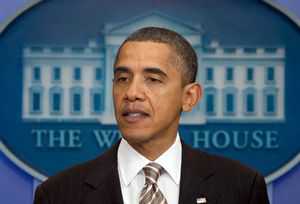A major think tank calls on President Obama not to recognize the killings of Armenians as ‘genocide’. ‘If Obama uses the word genocide, the Turkish response will be harsh and trigger a bitter breach in relations,’ the CSIS says.
The Center for Strategic and International Studies (CSIS), a major and bipartisan think tank in the United States capital, Monday called on President Barack Obama not to recognize World War I-era killings of Armenians in the Ottoman Empire as “genocide.”
Zbigniew Brzezinski, national security adviser for former President Jimmy Carter, and Brent Scowcroft, national security adviser for former Presidents Gerald Ford and George H. W. Bush, jointly introduced the CSIS report at a meeting.
Encourage and support rapprochement
“If President Obama takes no action to prevent congressional enactment of the (Armenian) resolution (pending in the House of Representatives), endorses the measure, or uses the word genocide himself, the Turkish response will be harsh and trigger a bitter breach in relations,” the CSIS said.
It said the United States, “rather than seek to legislate history,” should encourage and support rapprochement that Turkey and Armenia are trying to accomplish.
At the end of a European tour, Obama will visit Turkey April 5-7.
In a related development, four leading Democratic lawmakers sent a letter to President Abdullah Gul and Armenian President Serge Sarkisian, voicing their support for a Turkish-Armenian rapprochement.
“It is critical that the United States and international community support Armenia and Turkey during their ongoing efforts to normalize relations and create positive dynamics in the Caucasus region,” Congressman Robert Wexler said on behalf of the four men.
Four leading lawmakers
“It is in the interest of the United States and both Armenia and Turkey that differences between Yerevan and Ankara are overcome and that a solid foundation is laid to enhance cooperation and diplomatic relations between these two nations,” he said.
The letter was signed by Wexler, chairman of the Subcommittee on Europe in the House Committee on Foreign Affairs; Ike Skelton, Chairman of the House Armed Services Committee; John Murtha, Chairman of the Subcommittee on Defense in the House Committee on Appropriations; and Alcee L. Hastings, Co-Chairman of the Commission on Security and Cooperation in Europe (the U.S. Helsinki Commission).
Comments on domestic front
On domestic policy, the CSIS said the end of the ruling Justice and Development Party, or AKP’s, domination was not imminent, although opposition parties would benefit from the AKP’s gradual loss of support. The AKP won Sunday’s nationwide local elections, but its popular support dropped compared to previous polls.
“The AKP is likely to refrain from (earlier plans) of a major revision of the Constitution,” the CSIS said.
Asked to comment on “the pressure on the media by the government” and a near-$500 million penalty imposed on Doğan Holding media group, Bulent Aliriza, director of Turkey Project at CSIS and writer of the domestic politics section in the report, said he was concerned over the “unfortunate” developments.
“I hope the government would ease its position on the media,” he said.
—-
LOGOGLU: OBAMA WILL USE THE TERM “GENOCIDE” |
Turkey’s retired ambassador to Washington, Faruk Logoglu claimed that U.S. President Barack Obama will use the term “Armenian genocide” during his speech on 24 April, after his Turkey visit.
Logoglu said that he considers that U.S. President will use the term “genocide” for 1915 events. He said, “A resolution is introduced to Congress. Turkey and its friends should prevent these happening with using lobby organizations in United States.”
Speaking at the same place, Adana Consul of United States, Eric Green said, “The decision of Obama on visiting Turkey shows the importance of Turkey for Obama administration. I agree with the opinion that Turkey will be the energy corridor that transfers energy from Iran, Iraq and from east. We heard about anti-US opinion in Turkey. During the time since i have been in Adana, people of the city were so friendly and hospitable against us.”———————–
TURKISH FORUMS POINT OF VIEW
https://www.turkishnews.com/en/content/2009/02/23/1915-truths-have-reached-president-obama-and-decision/>/
https://www.turkishnews.com/tr/content/2009/02/23/1915-olaylari-baskan-obamaya-hakiketler-ulasdi-ve-karar/
TURKISH FORUMDAN DOSTLARINA VE UYELERINE ACiLCAGRI
2009 MEMBERSHIP DUES AND YOUR DONATIONS ARE NEEDED TO CONTINUE OUR POSTED PROGRAMS WITH OUT INTERUPTION
THE FOLLOWING LINKS WILL TAKE YOU TO THE DUES AND DONATIONS PAGE
https://www.turkishnews.com/tr/content/2009/02/14/2009-yili-uye-aidatlari-ve-bagislariniz/
Turkish Forum — Biz Kimiz? — Bize Ulaşın — Projelerimiz — Yardımlarınız
Hakkımızda (About Us) | Kayıt Ol (Subscribe) | Bize Yazın (Contact Us) | Bağışlarınız (Donations) | Güncelle (Update)



 He Says Budget Is Key to Recovery
He Says Budget Is Key to Recovery Video
Video Full News Conference: ObamaPresident Obama held a prime-time news conference Tuesday addressing the economic recession, his administration’s recovery strategy, and other current events during the first 60 days of his presidency. » LAUNCH VIDEO PLAYER
Full News Conference: ObamaPresident Obama held a prime-time news conference Tuesday addressing the economic recession, his administration’s recovery strategy, and other current events during the first 60 days of his presidency. » LAUNCH VIDEO PLAYER


